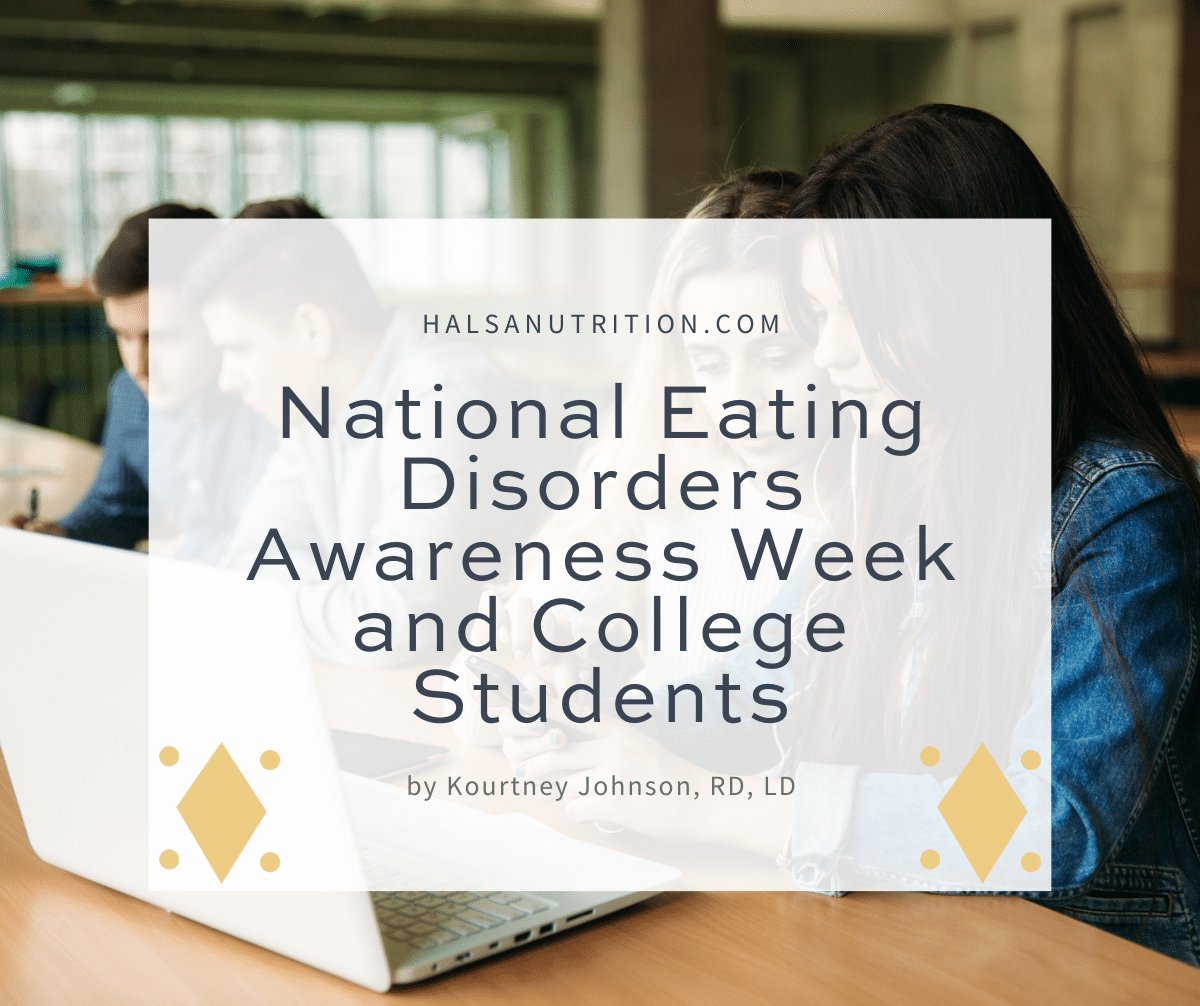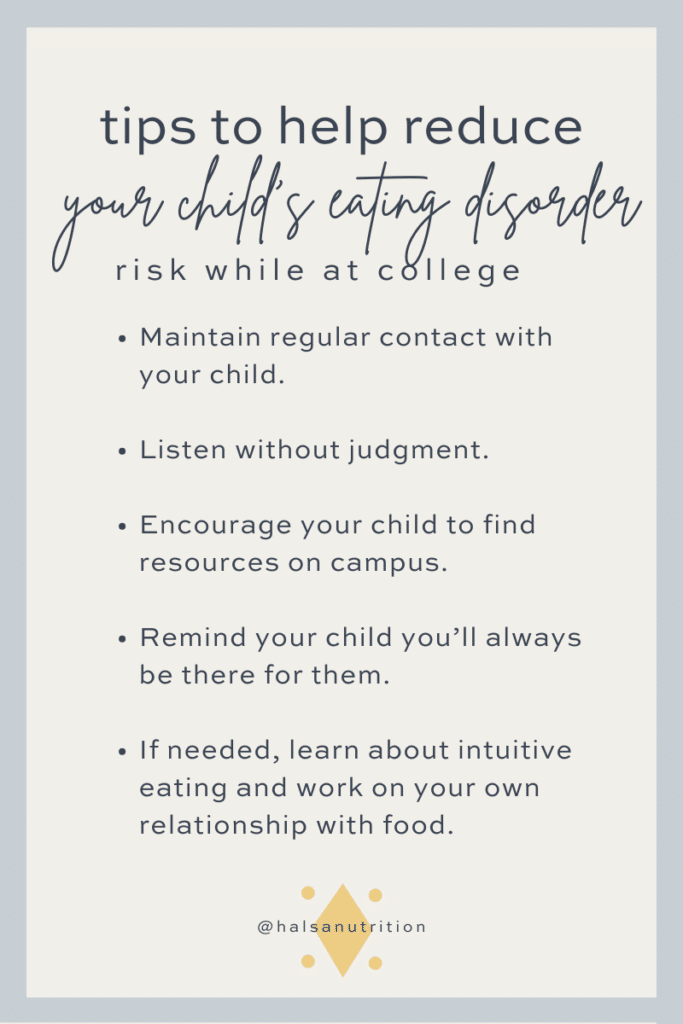
National Eating Disorders Awareness Week and College Students
Estimated reading time: 6 minutes
Every year, in late February, a week is dedicated to raising awareness and educating people about eating disorders (EDs). National Eating Disorders Awareness Week helps shed light on the risks that college students have of developing EDs.
Studies have shown that this is a prime time to develop an ED, which parents aren’t always aware of. Here is why people in this age group are prone to developing them, how to prevent EDs from occurring, and what you can do to support your child. But first, here’s a brief background on National Eating Disorders Awareness Week.

Why Does National Eating Disorders Awareness Week Exist?
The purpose of this week is to educate people about this group of serious illnesses and provide support for those affected by them. Being aware of EDs is crucial so they are recognized more easily, people who are impacted can have better support, and those suffering from EDs can achieve better treatment outcomes.
Risk Factors of EDs in College Students
EDs are impacted by social, biological, and psychological factors. Social media plays a role in increasing risk among all young people. In addition, college offers the perfect environment for them to develop, with additional risk factors such as the following:
- Adjusting to independence and more responsibilities
- Experiencing a change in routine and possibly less structure
- Having access to a more extensive variety of food
- Not having access to the usual food eaten at home
- Being afraid of gaining the “Freshman 15”
- The desire to fit in
Moreover, studies have shown that student-athletes and gender-minority students have an increased likelihood of developing EDs. Research from 2015 found that students who are transgender are four times more likely to have an ED. And while all male and female athletes are at risk, those participating in sports that focus on body shape and weight (and often encourage disordered eating) are at the highest risk. These sports often include but are not limited to cross country, track, gymnastics, wrestling, and dance. All athletes are at higher risk simply because of the attention put on fueling and performance.
Tips for Parents of College Students During National Eating Disorders Awareness Week and Every Week
Here are suggestions on how you can help protect your child from an eating disorder this week and every week.
Shift the focus away from weight gain
Diet culture teaches us to focus excessively on weight gain with the assumption that an increase in weight is bad. That’s why it’s unsurprising that parents are concerned about their children gaining weight in college (or anytime). However, this shows the importance of National Eating Disorders Awareness Week. We need to change the narrative around weight and be aware of how EDs are impacted by this topic.

Remember, if your child is overly excited about the food available on campus and you’re concerned that will impact their weight, the habituation effect will eventually take over and the new food will lose its appeal. Avoid making comments about what your child is eating and trust that they will eventually want a larger variety of food than the burgers, fries, or soda that are now exciting and readily available.
Also, keep in mind that the “Freshman 15” is fear-based. Research shows that on average, college students gain two to five pounds, far from the dreaded 15 that most people focus on. And again, even if this myth was true, helping your child avoid an ED while developing a healthy relationship with food is more important.
Specific suggestions for helping to reduce your child’s eating disorder risk
That said, you might be wondering what you can do to support your child and decrease their risk of developing an ED while they are at college.
While these recommendations might sound basic, they can be extremely helpful to your child as they navigate life away from home for the first time.
- Maintain regular contact with your child
- Listen without judgment
- Encourage your child to find resources on campus
- Remind your child you’ll always be there for them
- If needed, learn about intuitive eating and work on your own relationship with food

Keep in mind that many campuses have counseling centers available, and if they don’t offer support for EDs, they often have providers to refer out to.
The benefits of working with a registered dietitian
As National Eating Disorders Awareness Week 2024 demonstrates, education and prevention around EDs is extremely important. Resources such as counseling centers, supportive peers, and a listening ear can play a role in helping prevent an ED from developing. However, working with an Intuitive Eating-focused registered dietitian can also do wonders for your child. Even if he or she does not have an ED, giving them the opportunity to create a healthy relationship with food is priceless. Not only will your child have the skills to navigate diet culture, but they’ll be able to positively influence others with the knowledge they’ve obtained.
If you would like to learn more about working with Maria, schedule a free call! Together you can chat about your concerns and options for support so you can make a well-informed decision!
Additional Eating Disorder Resources
- National Alliance for Eating Disorders
- National Association of Anorexia Nervosa and Associated Disorders
- The Emily Program
Other Posts You Might Like
- How to Stay Well in College and Beyond
- Disordered Eating: More Common than You Realize
- The Joy of Food: Why Eating for Health Isn’t Always the Most Important Thing
- The 10 Principles of Intuitive Eating Help You to Be Kind to Your Body
- An Intuitive Eating Plate and Other Plate Models
- What is Nutritionism?
- 20 Nourishing Snack Ideas and Donut Apples
About the Author
Kourtney is a registered dietitian who is passionate about sharing information related to intuitive eating and the harms of diet culture. She is from Minnesota but now lives in Spain, where she enjoys trying new foods and learning more about the culture there! In her free time, she likes to read, go to the beach, spend time with friends and family, and travel.
This article was edited and reviewed by Maria Adams, MS, MPH, RDN, LDN, a registered dietitian and Certified Intuitive Eating Counselor. Maria takes a weight-inclusive approach and helps individuals rediscover the joy of food and eat to feel their best by healing from chronic dieting and disordered eating. She holds a Bachelor of Science Degree in Nutrition Science, a Master of Science in Nutrition Communication, and a Master of Public Health.
Leave a Reply